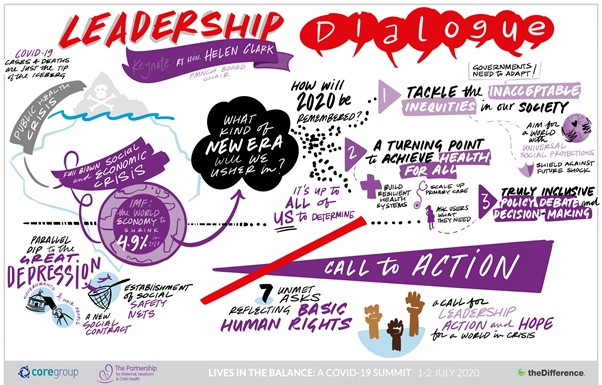By: Sandra Yvonne Oketch
COVID- 19 is a public health crisis that has ravaged the health and economic situations and magnified the disparities and inequality that already exists in many women, adolescents and children. This impact has led to disruptions in health services that include: management of acute malnutrition, provision of family planning and immunizations, antenatal and postal care, HIV/ AIDS care and many other services.
The Lives in the balance a COVID 19 virtual summit held on the 1st and 2nd July 2020 was hosted by Partnership for Maternal, Newborn & Child Health (PMNCH) and Core Group bringing together key stakeholders to discuss the impact of COVID- 19 on the health and wellbeing of women, children and adolescents.
The highlights from key note speakers:
The first keynote speaker, was the WHO Director and he emphasized on the need of having multi-stakeholder platforms in the response to the COVID- 19 pandemic.
“First, we need to advocate for an intersectoral approach informed by rights- based and gender-responsive laws, policies and services in our different responses to COVID- 19”
“Second, we need to address the gaps in countries where routine data systems have collapsed, which hampers our ability to assess and respond to the impact of the pandemic on low-income families”
“Third, we must focus our attention on the most vulnerable populations- especially those in humanitarian situations- who are being overlooked in the response”
The second keynote address was from the Rt. Hon Hellen Clark, who is the PMNCH Board Chair and former prime minister for New Zealand.
She pointed out that the women and adolescent girls are vulnerable during this current pandemic stressing on the need for their voices to be heard and that, PMNCH partners are calling on Governments to: strengthen efforts to advance sexual reproductive health and rights and gender equality; protect investments in sexual, reproductive, maternal, newborn, child and adolescent health services; ensure quality, respectful and dignified care; provide better support and protection for the health workforce, notably nurses and midwives; guarantee social protection nets for all; deliver functional, safe and clean water and sanitation facilities; scale-up prevention of violence against women, children and adolescents.
“Let this be the moment that we tackle the inacceptable inequalities in our societies. To do that, governments need to adopt, extend and scale-up social protection programmes such as cash transfers, food assistance, social insurance and child benefit schemes which offers a shield against future shocks”. (Rt. Hon Hellen Clark)
“Let this be the turning point for achieving universal health coverage. We must be relentless in our drive to build resilient health systems that provide accessible, high quality services to all”. (Rt. Hon Hellen Clark)
Panel Discussions:
The Rt. Hon Hellen Clark, chaired the panel on the actions that can/must be taken to improve the health and wellbeing of the children, adolescents and mothers. The panel members were: KK Shailajah, Minister of Health, Government of Kerala in India; Gabriela Cuevas Barron, member of parliament in Mexico; Mark Dybul, Co- Director, Center for Global Health Practice and Impact; Dr. Joannie Bewa, physician and interim board chair, women in Global health.

Some of the conversations that arose from the panelist discussions included the call for urgent action to mitigate the effects of COVID 19 to women, adolescents and children and an inclusion of social protection for all. There is a growing concern on SRHR service disruptions and thus need to strengthen the SRHR services to avert the so many preventable deaths. The panelists agreed, on an urgent need to massively scale up public health investments and most specifically in the primary health care.
The ‘What women want campaign’ amplifies the voices of women on what women want and need including respectful and dignified midwifery care. Using such avenues, lays bare the women’s immediate needs and stirs up conversations around those needs and in turn, leads to actionable points.
The adolescents and youths are disproportionately affected more so those with chronic conditions, the disabled, those living in poor and emergency settings. Some of the challenges include: limited coping mechanism amongst the poor populations during the current pandemic, rise in GBV cases, limited access to SRH services and disruption in civic participation.
Notably, there is a worrying trend on increase in unplanned teenage pregnancies during this pandemic and a call for urgent intervention by stakeholders, to arrest the situation through meaningful engagements with the youths and their leadership.
A youth centered responsive approach, is key where the youth voices are included in the decision making spaces which is not happening now. Case in point, there is limited appointments of young leaders and professionals as part of national taskforces. Youths have played a critical role in the current pandemic in a number of ways: knowledge dissemination and production; are at the forefront in emergency; innovations and equipment development and the use of technology to enhance community cohesion and communication across globes.
Dr. Joannie highlighted the various ways on how young people have stepped up in the COVID 19 response and the need, to engage the young leaders more in the global space and national taskforces. “Young health professionals have put themselves at risk by being in the front line to provide emergency & essential health services, design of life saving medical products e.g. local ventilators, participation in knowledge dissemination and production about COVID 19, infection control and prevention through digital technology initiatives to engage and enhance community cohesion”.
